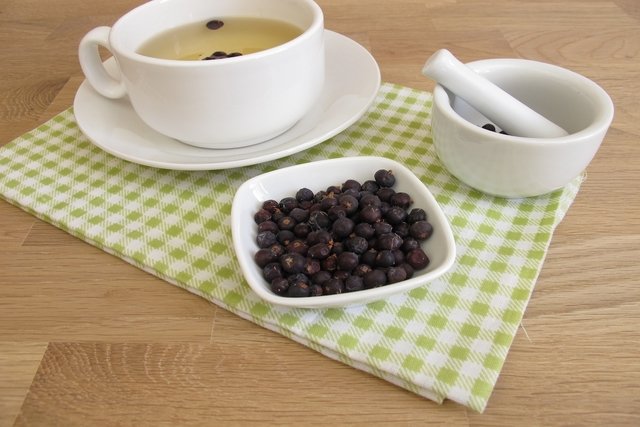Juniper is a medicinal plant of the species Common juniper, known as cedar, juniper, geneva, common juniper or juniper, which produces round, bluish or black fruits. The fruits are also known as juniper berries and are rich in oils such as myrcene and cineole, as well as flavonoids and vitamin C, and are used to treat various health problems, especially stomach and skin problems, inflammation and urinary infections.
Although it has several health benefits, the use of juniper can also cause several side effects, especially when the plant is consumed in excessive quantities and for more than 6 weeks and include kidney and gastrointestinal problems, increased uterine contractions, miscarriage and irritation of the bladder. Juniper is contraindicated for pregnant women and people with nephritis.
Juniper can be purchased at health food stores or street markets. However, its use should always be carried out under the guidance of a doctor or other healthcare professional who has experience with the use of medicinal plants.

What is it for
Juniper has antioxidant, antibacterial, anti-inflammatory, sedative, hypoglycemic, lipid-lowering, digestive, analgesic and diuretic activities and, therefore, can bring several health benefits, the main ones being:
1. Eliminates fungi and bacteria
Juniper has essential oils such as sabinene, limonene, myrcene and pinene capable of eliminating fungi, especially skin fungi, such as Candida sp. and bacteria such as:
- Escherichia coli that causes urinary tract infections;
- Staphylococcus aureus that cause lung, skin and bone infections;
- Hafnia avenue which are part of the normal intestinal flora, but which can also cause pneumonia, urinary tract infections, kidney infections and some intestinal diseases;
- Pseudomonas aeruginosa that cause lung infections, ear infections and urinary infections.
Furthermore, the alcoholic extract of juniper also has action against bacteria, including Campylobacter jejuni which can cause food poisoning and Staphylococcus aureus which is capable of causing infections in the skin, lungs and bones.
2. Has anti-inflammatory action
Essential oils and flavonoids such as rutin, luteolin and apigenin present in the hydroalcoholic extract of juniper berry, work as potent anti-inflammatories, being very useful in treating inflammation in the throat and intestine, as well as helping to reduce muscle and joint pain and tendonitis. , for example, as it reduces the production of inflammatory substances such as prostaglandins and cytokines.
3. Fights urinary tract infections
Juniper has a diuretic action, increasing urine production and cleaning the urethra. Therefore, it can be used to help treat urinary infections and prevent the formation of kidney stones.
The increase in urine production caused by the essential oils present in juniper also helps to combat rheumatic problems such as gout or arthritis by increasing the elimination of uric acid in the urine.
4. Reduces swelling
Juniper tea can be used to help reduce swelling, reducing fluid retention throughout the body due to its diuretic properties, being very useful especially in cases of kidney problems.
5. Improves the functioning of the digestive system
The essential oils present in juniper improve digestion by controlling the flow of bile from the liver and stomach acids, and increasing the production of digestive enzymes, regulating the digestive process. Furthermore, the astringent properties of juniper reduce the acidity of the stomach and thus help in treating ulcers.
Juniper also protects the liver, reduces the production of intestinal gas, combats diarrhea and helps treat worms and intestinal infections.
6. Has antioxidant action
Juniper has phenolic compounds in its composition such as bioflavonoids and terpenes such as sabinene, limonene, myrcene and pinene that have antioxidant action, combating free radicals and reducing cell damage. Thus, juniper helps prevent and combat diseases associated with oxidative stress caused by free radicals, such as atherosclerosis.
Furthermore, some animal studies show that juniper oil, due to its antioxidant properties, provides a protective effect on the nervous system, and may help in the treatment of Parkinson’s and Alzheimer’s diseases. However, studies in humans are still needed.
7. Protects against cardiovascular diseases
Juniper contains essential oils such as totarol and flavonoids such as rutin, which have anti-inflammatory and antioxidant action that help reduce the absorption of cholesterol, reducing the risk of cardiovascular diseases such as myocardial infarction and atherosclerosis.
Furthermore, the diuretic property of juniper also helps control blood pressure, which is essential for the proper functioning of the cardiovascular system.
8. Controls blood glucose
Some studies show that flavonoids such as rutin and amentoflavone in alcoholic extract and juniper tea can stimulate insulin production and reduce blood sugar levels, and can be an important ally in the treatment of diabetes.
9. Reduces pain
The alcoholic extract of juniper has substances such as pinene, linalool and octanol with analgesic effects and flavonoids such as rutin, luteolin and apigenin with anti-inflammatory effects, helping to reduce pain by inhibiting the activity of substances involved in pain such as cyclooxygenase, for example. .
10. It has a calming effect
The aroma of juniper essential oil has calming properties and can therefore aid sleep, helping to combat insomnia and improve sleep quality. The essential oil can be inhaled directly from the bottle or you can drink juniper tea before going to sleep.
11. Combats respiratory problems
The antioxidants in juniper, such as rutin and sugiol, are linked to the improvement of asthma and bronchitis, especially when the essential oil is used to vaporize.
12. Improves skin quality
Vitamin C, antioxidants and anti-inflammatory substances present in juniper berry tone and cleanse the skin as they are antiseptic and astringent, improving skin quality, in addition to treating problems such as allergies, acne, eczema, psoriasis and scalp dandruff.
Juniper can also be used on skin wounds due to its antibacterial properties.
How to use juniper

The normally used part of juniper is its entire fruit from which its active substances are extracted and can be consumed in the form of tea, tincture, also called alcoholic extract, or used in the form of essential oil or in the form of ointments and creams for the skin.
The main ways to use juniper are:
- Juniper tea: Place 2 to 3 juniper berries (fruit) in a cup of boiling water and cover. Let it rest for 5 minutes and filter. It is recommended to drink a maximum of 1 to 3 cups per day for a maximum period of 6 weeks;
- Juniper tincture (for external use): the tincture or alcoholic extract can be purchased at natural product pharmacies, herbalists or made at home. To prepare the tincture, crush 10 juniper berries into 1 cup of 70% grain alcohol or brandy. Place the mixture in a clean, dark, covered container and let it sit for 1 week, but it is important to shake the bottle every day to extract the juniper components. After this period, filter and store. The tincture can be used on the skin in cases of rheumatism or for muscle pain;
- Juniper essential oils (for external use): juniper essential oil can be used as a flavoring, vaporized for lung problems or on the skin when mixed with another vegetable oil, such as almond oil. See other ways to use essential oil.
- Juniper cream or ointment (for external use): juniper cream or ointment can be purchased at natural product pharmacies and used on the skin in cases of muscle or joint pain, cramps, rheumatism, gout or arthritis.
Another way to use juniper is in sitz baths to treat hemorrhoids, due to its anti-inflammatory properties, and should be prepared using 1 small spoon of juniper tea in 100 to 200mL of bath water.
In addition, you can also prepare a conditioner, to be used on the scalp in cases of psoriasis, by mixing 10 drops of juniper xylem essential oil in 1 tablespoon of almond oil and 600 mL of hot water. Let the mixture cool and apply to the scalp for 15 minutes and then rinse.
Possible side effects
Juniper is safe for most adults when consumed for a short period of time, inhaled as a vapor, or used on the skin in small areas.
However, if juniper is consumed in excessive quantities or for more than 6 weeks, it can cause respiratory and kidney problems, irritation of the intestines, bladder or skin, make it difficult to control blood pressure in cases of hypertension or greatly reduce blood levels. blood sugar causing hypoglycemia crisis in diabetics. Additionally, juniper can cause increased uterine contractions and miscarriage.
You should seek medical help immediately or the nearest emergency room if you experience symptoms of juniper poisoning, such as difficulty breathing, nausea, vomiting or convulsions.
Who shouldn’t use
Juniper should not be used by babies, children, pregnant or breastfeeding women and people with nephritis, which is an infection of the kidneys. If you suspect pregnancy, it is recommended that, before using juniper, a pregnancy test is carried out, as juniper can cause miscarriage by increasing uterine contractions.
Furthermore, juniper should be used with caution by diabetics or hypertensive patients, as it can increase the effect of medications for these diseases and cause side effects.
Juniper essential oil should not be ingested or used directly on the skin due to its high intoxication capacity.
It is important to use juniper under the guidance of a doctor, herbalist or a healthcare professional with specific knowledge of medicinal plants.

Sign up for our newsletter and stay up to date with exclusive news
that can transform your routine!
Warning: Undefined array key "title" in /home/storelat/public_html/wp-content/plugins/link-whisper-premium/templates/frontend/related-posts.php on line 12
Warning: Undefined array key "title_tag" in /home/storelat/public_html/wp-content/plugins/link-whisper-premium/templates/frontend/related-posts.php on line 13




